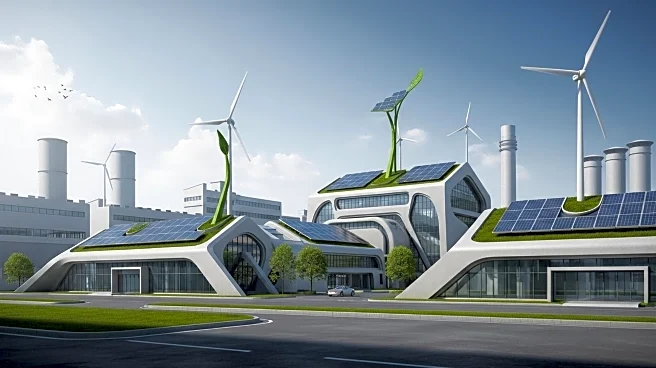What's Happening?
Northwest Indiana activists are advocating for the establishment of a green steel mill in Gary following the partnership between Nippon Steel and U.S. Steel. Terry Steagall, a retired steelworker and member of the Gary Advocates for Responsible Development’s Green Steel Committee, is pushing for the use of direct reduction iron furnaces, which are considered more environmentally friendly. The partnership, finalized in June, involves a $4 billion investment from Nippon Steel, with $1 billion earmarked for Gary Works. Steagall emphasizes the importance of transitioning to new technology to reduce pollution and sustain steelmaking in the region. U.S. Steel has expressed commitment to cleaner steel production methods as part of its net-zero goals by 2050.
Why It's Important?
The push for green steel in Gary is significant as it aligns with broader environmental goals and could transform the local economy. Transitioning to direct reduction furnaces could reduce pollution and greenhouse gas emissions, benefiting the community and environment. The investment in new technology could secure the future of steelmaking in Gary, preventing potential shutdowns due to outdated methods. This development could also enhance Gary's economic prospects by attracting further investments and creating jobs, while contributing to global efforts to combat climate change.
What's Next?
The future of steelmaking in Gary hinges on the decisions made by Nippon Steel and U.S. Steel regarding technology upgrades. Activists and local leaders are expected to continue advocating for green steel solutions. The companies are exploring various technologies to meet their environmental commitments, including carbon capture projects. The outcome of these discussions and investments will determine the sustainability and economic viability of Gary Works, impacting the local community and broader industry trends.
Beyond the Headlines
The shift towards green steel in Gary could set a precedent for other industrial regions facing similar environmental challenges. It highlights the ethical responsibility of corporations to invest in sustainable practices and the role of community advocacy in driving change. The potential transformation of Gary Works could also influence cultural perceptions of the steel industry, emphasizing innovation and environmental stewardship.










